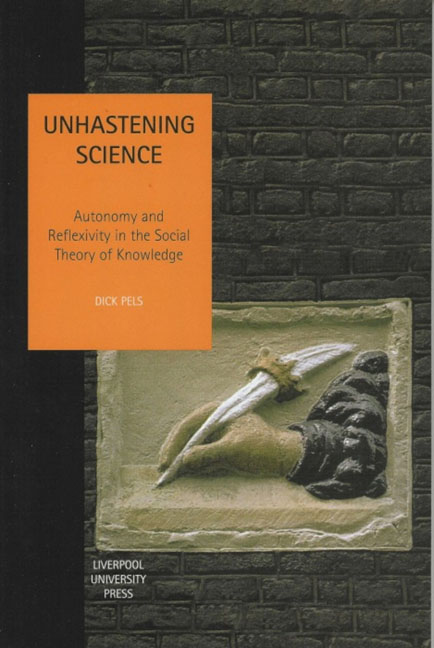Book contents
- Frontmatter
- Dedication
- Contents
- Acknowledgments
- 1 The Timescape of Science
- 2 What (Again) is So Special about Science?
- 3 Two Traditions in the Social Theory of Knowledge
- 4 The Natural Proximity of Facts and Values
- 5 Knowledge Politics and Anti-Politics: Bourdieu on Science and Intellectuals
- 6 The Politics of Symmetry
- 7 Reflexivity: One Step Up
- 8 Intellectual Autonomy and the Politics of Slow Motion
- Epilogue: Weak Social Theory
- Notes
- Bibliography
- Index
4 - The Natural Proximity of Facts and Values
- Frontmatter
- Dedication
- Contents
- Acknowledgments
- 1 The Timescape of Science
- 2 What (Again) is So Special about Science?
- 3 Two Traditions in the Social Theory of Knowledge
- 4 The Natural Proximity of Facts and Values
- 5 Knowledge Politics and Anti-Politics: Bourdieu on Science and Intellectuals
- 6 The Politics of Symmetry
- 7 Reflexivity: One Step Up
- 8 Intellectual Autonomy and the Politics of Slow Motion
- Epilogue: Weak Social Theory
- Notes
- Bibliography
- Index
Summary
The Fact/Value Split
Values, the cultural pessimist laments, are no longer what they used to be. The language and practice of contemporary morality, critics such as MacIntyre, Bloom, Scruton and Finkielkraut agree, suffers from a deplorable state of confusion: ethical judgments are permanently contested and seem no longer capable of being rationally justified. But Facts also, fellow pessimists hasten to add, are only a slim shadow of their former self. Ever since Popper exchanged the inductivist metaphor of the rock-bottom of knowledge for the critical rationalist one of the swamp, empirical science appears to have lost all solid footing, rendering Kant's first question ‘What can we know?’ just as precarious and unanswerable as his second: ‘What ought we to do?’ To compound this twin complaint, there is a third, which completes the doleful a capella. The venerable art of distinguishing judgments of value from judgments of fact, or of avoiding logical contaminations between them, appears similarly lost to the contemporary mind. Traditionally hailed as one of the foremost accomplishments of Western rational culture, the categorical separation between Sein and Sollen, already undermined by neo-Marxist politicization drives since the late 1960s, is today unceremoniously swept into the intellectual dustbin by an entire generation of pragmatist, constructivist, and postmodern thinkers. The principle of value-freedom is routinely debunked as an antiquarian dogma that nobody in his or her right philosophical mind would care to reanimate.
In this chapter, I undertake to replace this threefold pessimism with a threefold optimism. The failure of the classical Enlightenment project to secure a rational foundation for moral values and empirical explanations is not a twin intellectual distaster, but might be celebrated as a double awakening from an impossible and perilous dream. The ‘unfoundedness’ of both genres of judgment is not a double trap-door leading towards cognitive irregularity and moral licence, but a sign of epistemological and axiological modesty, signalling the absence of the symbolic violence that so naturally accompanies the (universal) temptation to universalize our set preferences and pet ideas. However, this chapter will not be focally concerned with such currently over-rehearsed critiques of foundationalism.
- Type
- Chapter
- Information
- Unhastening ScienceAutonomy and Reflexivity in the Social theory of Knowledge, pp. 74 - 107Publisher: Liverpool University PressPrint publication year: 2003



